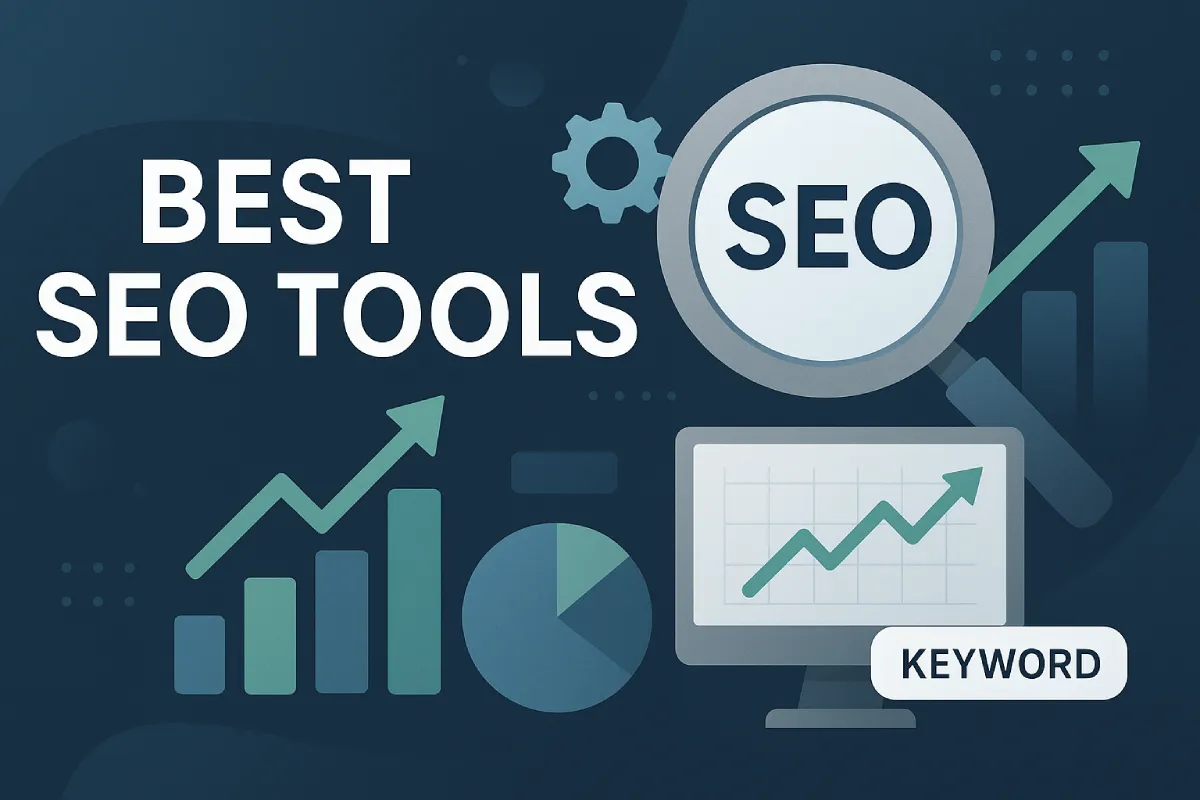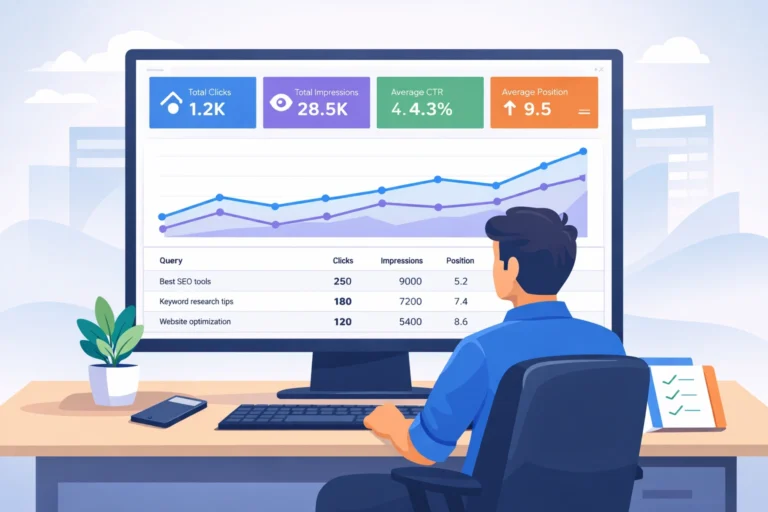Best SEO Tools: Free and Paid SEO Audit & Keyword Research Tools
In today’s competitive digital landscape, having access to the right SEO tools can make the difference between a website that thrives and one that gets lost in search results. Whether you’re a beginner blogger, a digital marketer, or an enterprise-level SEO professional, finding the best SEO tools for your needs is crucial to your success.
The challenge isn’t finding SEO tools—it’s finding the ones that actually deliver results without breaking your budget. This comprehensive guide walks you through the top SEO tools available today, including free SEO tool options and powerful SEO audit tools that can transform how you approach search engine optimization.
What Are SEO Tools and Why Do You Need Them?
SEO tools are software platforms and applications designed to help you optimize your website for search engines. They provide data-driven insights into how your site performs, where your competitors rank, which keywords drive traffic, and what technical issues might be holding you back.
The best SEO tools serve multiple purposes:
- Analyzing your website’s technical health through comprehensive SEO audits
- Researching keywords that your target audience is searching for
- Tracking your rankings across search engines
- Monitoring backlinks and competitor strategies
- Identifying content opportunities
- Measuring ROI from your SEO efforts
Without these tools, you’re essentially flying blind, making decisions based on guesswork rather than data. The right SEO tool transforms your strategy from reactive to proactive.
Types of SEO Tools You Need
Explore different categories of SEO tools and how each contributes to better rankings.
SEO Audit Tools
An SEO audit tool is essential for identifying technical problems that prevent your site from ranking. These tools crawl your website and generate detailed reports on issues like broken links, missing meta tags, slow page speed, mobile usability problems, and duplicate content.
The best SEO audit tools provide:
- Comprehensive site crawls
- Priority-based issue reporting
- Actionable recommendations
- Historical tracking to measure improvements
- Competitor analysis capabilities
Keyword Research Tools
Keyword research tools help you discover what your audience is searching for and how difficult it is to rank for those terms. They provide search volume data, competition levels, and keyword variations that inform your content strategy.
Rank Tracking Tools
These tools monitor your website’s position in search results for your target keywords, helping you measure the impact of your SEO efforts over time.
Backlink Analysis Tools
Backlink tools show you which websites link to yours, the quality of those links, and your competitors’ backlink profiles. This intelligence helps you develop a link-building strategy.
The Best SEO Tools: Our Top Recommendations
Discover the best-performing SEO tools—both free and paid—to improve your digital strategy.

1. Semrush
Semrush is one of the most comprehensive SEO platforms available. It combines keyword research, site audits, rank tracking, and competitive analysis in one powerful platform. While Semrush is a premium tool, it offers a free SEO tool version with limited features for those just starting.
Key Features:
- Full-site SEO audits with detailed issue reports
- Keyword research with search intent data
- Rank tracking across multiple search engines
- Competitor analysis and benchmarking
- Content optimization recommendations
Best For: Agencies and serious marketers who need comprehensive data and competitor insights.
2. Ahrefs
Ahrefs is renowned for its backlink analysis capabilities, making it an industry leader for link research. It’s also an excellent all-in-one SEO platform with strong keyword research and rank tracking features.
Key Features:
- Largest backlink database in the industry
- Site Explorer for competitive analysis
- Keyword Explorer with search volume data
- Content Gap analysis
- Rank tracking and monitoring
Best For: Link-building professionals and competitive researchers.
3. Moz Pro
Moz Pro offers a balanced approach to SEO tooling with strong fundamentals across all areas. Their SEO audit tool is particularly user-friendly, and their Keyword Explorer provides valuable search intent data.
Key Features:
- Comprehensive site crawls and audits
- Keyword research with difficulty scores
- Rank tracking
- Local SEO features
- Link research and analysis
Best For: Small to medium businesses wanting an intuitive, well-rounded platform.
4. Google Search Console (Free SEO Tool)
Don’t overlook Google Search Console, it’s a free SEO tool directly from Google that provides invaluable data about how your site appears in search results. It shows which queries drive traffic, your average ranking position, and click-through rates.
Key Features:
- Search performance data
- URL inspection tool
- Coverage reports
- Mobile usability issues
- Core Web Vitals monitoring
Best For: Every website owner. It’s free and essential.
5. Google Analytics 4 (Free SEO Tool)
While primarily an analytics platform, Google Analytics 4 is a free SEO tool that helps you understand how organic search traffic behaves on your site. Track which keywords bring visitors, how long they stay, and whether they convert.
Key Features:
- Organic traffic analysis
- Keyword performance tracking
- User behavior insights
- Conversion tracking
- Custom reporting
Best For: Understanding the business impact of your SEO efforts.
6. Ubersuggest
Ubersuggest is an affordable alternative to premium SEO tools, making it an excellent free SEO tool option for budget-conscious marketers. It provides keyword research, site audits, and rank tracking at a fraction of the cost of competitors.
Key Features:
- Keyword research with search volume and trends
- Site audit functionality
- Rank tracking
- Backlink analysis
- Content ideas and optimization suggestions
Best For: Solopreneurs, small businesses, and those new to SEO.
7. SE Ranking
SE Ranking is another budget-friendly option that doesn’t compromise on features. This SEO audit tool excels at providing detailed technical reports and is particularly strong for local SEO.
Key Features:
- Comprehensive site audits
- Keyword rank tracking
- Backlink monitoring
- Local SEO tools
- White-label options for agencies
Best For: Agencies and businesses seeking affordable, feature-rich solutions.
8. Screaming Frog (Free SEO Tool)
Screaming Frog is a free SEO tool that crawls your website to identify technical issues. The free version allows up to 500 URLs, making it perfect for smaller sites or spot-checking specific areas.
Key Features:
- Website crawling and analysis
- Duplicate content detection
- Redirect chain identification
- XML sitemap analysis
- Custom extraction
Best For: Technical SEO specialists and detailed site audits.
How to Choose the Best SEO Tools for Your Needs
Selecting the best SEO tools depends on several factors:
- Your Budget: Free SEO tool options exist for nearly every function, though premium tools offer more advanced features and larger datasets.
- Your Goals: Are you focused on keyword research, technical SEO, link building, or rank tracking? Different tools excel in different areas.
- Your Experience Level: Beginners benefit from intuitive interfaces, while advanced users may prefer tools with deeper customization options.
- Your Team Size: Solo practitioners have different needs than agencies managing multiple client accounts.
- Your Industry: Local businesses benefit from local SEO features, while e-commerce sites need different tools than SaaS companies.
Best Practices for Using SEO Tools
Maximize your results with these actionable tips for using SEO tools effectively.
- Start with an SEO Audit – Begin by running a comprehensive SEO audit tool report on your website. This identifies critical issues preventing your site from ranking. Prioritize fixes based on impact and difficulty.
- Conduct Thorough Keyword Research – Use your chosen keyword research tool to identify high-opportunity keywords—those with decent search volume but lower competition. Build your content strategy around these keywords.
- Monitor Your Progress – Set up rank tracking to monitor your keyword positions over time. Most SEO audit tools and premium platforms include this feature. Track metrics monthly to measure your SEO impact.
- Analyze Your Competitors – Use competitive analysis features in your SEO tools to understand what your competitors are ranking for and which backlinks they’ve built. This intelligence informs your strategy.
- Track Technical Health – Regularly run SEO audits to catch new technical issues. Many SEO audit tools offer scheduled crawls that alert you to problems automatically.
Free vs. Paid SEO Tools: What’s the Difference?
Compare the benefits and limitations of free and paid SEO tools before investing.
Free SEO Tool Advantages:
- No financial investment required
- Great for testing before committing to paid plans
- Sufficient for basic keyword research and site audits
- Google’s free tools provide official data
Free SEO Tool Limitations:
- Limited data history
- Smaller databases (especially for backlinks)
- Fewer advanced features
- Less frequent updates
- Limited reporting capabilities
Paid Tool Advantages:
- Comprehensive datasets
- Advanced features and customization
- Priority support
- Historical data for trend analysis
- Better for competitive research
Paid Tool Limitations:
- Ongoing subscription costs
- Steeper learning curve
- Overkill for very small sites
Common SEO Tool Features Explained
Understand essential SEO metrics like DA, KD, CPC, and search volume.
- Domain Authority (DA): A score predicting how well a domain will rank. Higher DA generally means better ranking potential.
- Keyword Difficulty (KD): A metric showing how hard it is to rank for a specific keyword. Lower KD scores represent easier ranking opportunities.
- Search Volume: The average number of searches for a keyword monthly. Higher volume means more potential traffic.
- Cost Per Click (CPC): The average amount advertisers pay for clicks on that keyword in Google Ads. Higher CPC often indicates commercial intent.
- Search Intent: Whether users searching for a keyword want informational, navigational, commercial, or transactional results.
Frequently Asked Questions
1. What does an SEO audit tool do?
An SEO audit tool crawls your website and identifies technical issues, on-page problems, and opportunities for improvement. It generates reports highlighting issues like broken links, missing meta tags, slow page speed, mobile usability problems, and duplicate content—all factors affecting your rankings.
2. How often should I run an SEO audit?
Run a comprehensive SEO audit quarterly or whenever you make significant website changes. Many SEO audit tools offer monthly automated crawls to catch new issues as they arise.
3. Can I do SEO without paid tools?
Yes, free tools like Google Search Console, Google Analytics, and Screaming Frog provide substantial value. However, paid tools offer advanced features, larger data limits, and more sophisticated analysis that accelerate results.
4. What’s the difference between free and paid SEO tools?
Paid tools offer higher data limits, more advanced features, faster updates, better support, and more detailed reporting. Free tools provide basic functionality suitable for smaller websites and learning purposes.
Conclusion
The best SEO tools are those that fit your specific needs, budget, and skill level. Whether you choose premium platforms like Semrush and Ahrefs or start with free SEO tool options like Google Search Console and Ubersuggest, the key is taking action on the insights these tools provide.
Begin with a comprehensive SEO audit tool assessment of your current site, identify your highest-opportunity keywords, and track your progress over time. As your needs grow, you can expand your toolkit with additional premium solutions.
Remember: the best SEO tool is the one you’ll actually use consistently. Start simple, measure results, and scale your tooling as your SEO program matures. Your rankings—and your organic traffic—will thank you. Stay ahead with Digirank — your trusted partner for smarter SEO solutions and growth-driven strategies.







